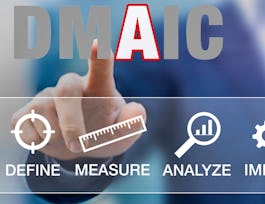This course will cover the Measure phase and portions of the Analyze phase of the Six Sigma DMAIC (Define, Measure, Analyze, Improve, and Control) process. You will learn about lean tools for process analysis, failure mode and effects analysis (FMEA), measurement system analysis (MSA) and gauge repeatability and reproducibility (GR&R), and you will be introduced to basic statistics. This course will outline useful measure and analysis phase tools and will give you an overview of statistics as they are related to the Six Sigma process.


Six Sigma Tools for Analyze
This course is part of Six Sigma Yellow Belt Specialization
Taught in English
Some content may not be translated



Instructors: Christina Scherrer, PhD
44,730 already enrolled
Included with 
Course
(1,780 reviews)
94%
Skills you'll gain
Details to know

Add to your LinkedIn profile
7 quizzes, 1 assignment
Course
(1,780 reviews)
94%
See how employees at top companies are mastering in-demand skills

Build your subject-matter expertise
- Learn new concepts from industry experts
- Gain a foundational understanding of a subject or tool
- Develop job-relevant skills with hands-on projects
- Earn a shareable career certificate


Earn a career certificate
Add this credential to your LinkedIn profile, resume, or CV
Share it on social media and in your performance review

There are 4 modules in this course
Welcome to Six Sigma Tools for Analyze! This is the third course in the Six Sigma Yellow Belt Specialization. Your team of instructors, Dr. Bill Bailey, Dr. David Cook, Dr. Christine Scherrer, and Dr. Gregory Wiles, currently work in the College of Engineering and Engineering Technology at Kennesaw State University. This module will introduce you to Measurement System Analysis (MSA) which is a key component of the Measure phase of the DMAIC process. You will also learn about Gauge Repeatability & Reproducibility (GR&R) and why it is used in the measurement phase.
What's included
2 videos4 readings1 quiz1 assignment
This module will introduce you to the Analysis phase of the DMAIC process. Process analysis helps you to better understand current processes and how they can be improved. You will be introduced to many of the different process analysis tools that are commonly used by Six Sigma experts. Failure Mode and Effects Analysis (FMEA) will also be introduced to help you better understand how to identify process failures.
What's included
6 videos4 readings2 quizzes1 discussion prompt
Root cause analysis is a common problem solving step. Determining the root cause of something is an important aspect of uncovering the causes of a problem. In this module you will review the different tools used in determining root cause including 5-whys, process mapping, force-field analysis, and matrix charts.
What's included
5 videos4 readings2 quizzes1 discussion prompt
In this module you will be diving into the statistical side of Six Sigma. You will begin with learning about the basic distribution types which include normal and binomial. You will then proceed to variation and will learn the difference between common and special cause variation.
What's included
7 videos4 readings2 quizzes
Instructors

Offered by
Recommended if you're interested in Business Essentials

University System of Georgia

University System of Georgia

University System of Georgia

University System of Georgia
Why people choose Coursera for their career




Learner reviews
Showing 3 of 1780
1,780 reviews
- 5 stars
78.68%
- 4 stars
17.27%
- 3 stars
2.97%
- 2 stars
0.61%
- 1 star
0.44%
New to Business Essentials? Start here.

Open new doors with Coursera Plus
Unlimited access to 7,000+ world-class courses, hands-on projects, and job-ready certificate programs - all included in your subscription
Advance your career with an online degree
Earn a degree from world-class universities - 100% online
Join over 3,400 global companies that choose Coursera for Business
Upskill your employees to excel in the digital economy
Frequently asked questions
Our applied curriculum is built around the latest handbook The Certified Six Sigma Handbook (2nd edition) and students will develop /learn the fundamentals of Six Sigma. Registration includes online access to all course content, projects, and resources. This price does not include the companion text The Certified Six Sigma Handbook (2nd edition).
Access to lectures and assignments depends on your type of enrollment. If you take a course in audit mode, you will be able to see most course materials for free. To access graded assignments and to earn a Certificate, you will need to purchase the Certificate experience, during or after your audit. If you don't see the audit option:
The course may not offer an audit option. You can try a Free Trial instead, or apply for Financial Aid.
The course may offer 'Full Course, No Certificate' instead. This option lets you see all course materials, submit required assessments, and get a final grade. This also means that you will not be able to purchase a Certificate experience.
When you enroll in the course, you get access to all of the courses in the Specialization, and you earn a certificate when you complete the work. Your electronic Certificate will be added to your Accomplishments page - from there, you can print your Certificate or add it to your LinkedIn profile. If you only want to read and view the course content, you can audit the course for free.


